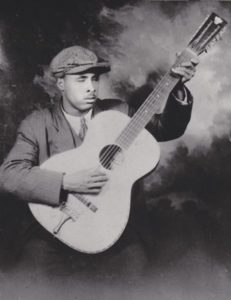
Blind Willie McTell
*Blind Willie McTell was born on this date in 1898. He was a Black Piedmont blues and ragtime singer and folk music guitarist.
McTell (born William Samuel McTier) was from Thomson, Georgia. He was born blind in one eye and lost his remaining vision by late childhood. He attended schools for blind students in Georgia, New York, and Michigan. He showed proficiency in music from an early age, first playing the harmonica and accordion, learning to read and write music in Braille, and turning to the six-string guitar in his early teens.
His family background was rich in music; his parents and an uncle played the guitar. He was related to the bluesman and gospel pioneer Thomas A. Dorsey. His father left the family when Willie was young. After his mother died in the 1920s, he left his hometown and became an itinerant musician, or "songster."
He began his recording career in 1927 for Victor Records in Atlanta. McTell married Ruth Kate Williams in 1934. She accompanied him on stage and made several recordings before becoming a nurse in 1939. They lived apart most of their marriage; she was in Fort Gordon, near Augusta, and worked around Atlanta. Before World War II, McTell traveled, performed, and recorded for several labels under different names. Like Leadbelly, he favored the somewhat unwieldy and unusual twelve-string guitar, whose greater volume made it suitable for outdoor playing.
In 1940, John A. Lomax and his wife interviewed and recorded McTell for the Archive of American Folk Song of the Library of Congress in a two-hour session held in their hotel room in Atlanta. These recordings document McTell's distinctive musical style, bridging the gap between the raw country blues of the early 20th century and the more conventionally melodic, ragtime-influenced East Coast Piedmont blues sound. In the interview, Lomax asked if McTell knew any "complaining" songs (an earlier term for protest songs). The Singer replies somewhat uncomfortably and evasively that he does not. The Library of Congress paid McTell $10, the equivalent of $154.56 in 2011, for this two-hour session.
McTell continued to perform around Atlanta, but his career was cut short by ill health, mainly diabetes and alcoholism. In 1957 he was a preacher at Mt. Zion Baptist Church in Atlanta. McTell died of a stroke in Milledgeville, Georgia, on August 19, 1959. He was buried at Jones Grove Church, near Thomson, Georgia, his birthplace. A fan paid to have a gravestone erected in his resting place. He was inducted into the Blues Foundation's Blues Hall of Fame in 1981 and the Georgia Music Hall of Fame in 1990.
One of McTell's most famous songs, "Statesboro Blues," was frequently performed by the Allman Brothers Band; it also contributes to Canned Heat's "Goin' Up the Country." Bob Dylan paid tribute to McTell on at least four occasions. A billiards bar and concert venue was named after McTell in the 1990s. The venue is now closed, but it remains a fond memory for Georgia Southern University students at the time. In Atlanta, a blues bar is named after McTell and regularly features blues musicians and bands. The Blind Willie McTell Blues Festival is held annually in Thomson, Georgia.
To Become a musician or Singer.
To Become a Conductor or Composer